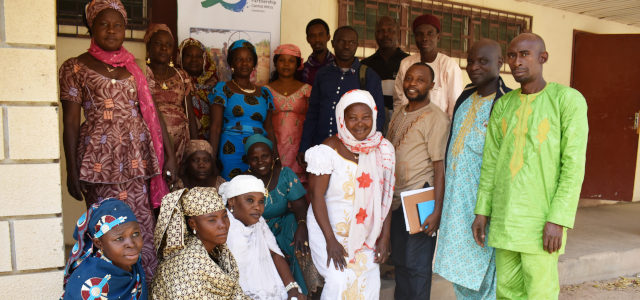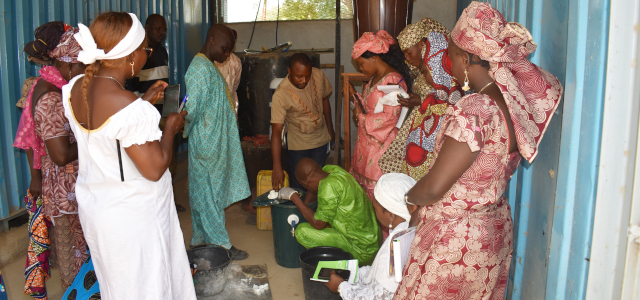Between March 2017 and June 2018, GWP Cameroon, the Cameroon Ministry of Water and Energy and UNICEF Cameroon implemented a project: “Improving the resilience of WASH services in the Mayo Tsanaga river basin through pilot initiatives”. This project resulted in the production and distribution of sensitisation materials to avoid health impacts of excess fluoride in groundwater. It also resulted in the construction of furnaces for production of “bone char” (raw material for fluoride removal) and the development and successful testing of a household filtration system for fluoride removal.
During the process of production and distribution of the sensitisation materials, leaders and members in the communities affirmed that the impacts of fluorosis were felt more by women than men, and therefore recommended that women should be at the core of any efforts to manage the fluorosis.
The women leaders were identified through a participatory selection process with municipalities of the two communities (by the rural development experts of the councils). They were trained by the GWP Cameroon Project Manager and a Gender Expert recruited by GWP Cameroon to study the gender differentiated impacts of fluorosis.
Participants were initially sensitised on the origin of the problem of "fluorosis" in drinking water, and its impacts on human health. Then they were trained on the technological unit and process developed for production of the raw material (“bone char”) that extracts fluoride from groundwater, and the use of the filter adapted for removing fluoride in drinking water at the household level.
At the close of the workshop, the women made proposals on how to facilitate the utilisation of the fluoride removal filters by households. They mentioned the need to adopt a two-phase-approach for introducing the filters into the communities: the first phase will be focused on identifying “pilot households” who will obtain filters for free and test them within their home. Once any challenges have been identified by these pilot households and rectified through refining the filter and “bone char”, the second phase will involve continuous sensitisation through churches and health centres.
Another proposal emphasized the importance of organising the population into communities to facilitate “bone char” production. Moreover, mobilising technical NGOs and institutional partners operating in the area will be crucial for mainstreaming this initiative into their development projects and facilitating uptake of technology at a broader scale.
According to one participant interviewed, they have been equipped with knowledge to raise awareness on the “silent” fluorosis that has ravaged their communities, about its origins and the technology required to prevent fluorosis. They stressed the need to finalise the fluoride removal treatment filter for ease of use, and to set up aggressive sensitisation for immediate uptake and use, given the urgency and irreversibility of dental fluorosis.

